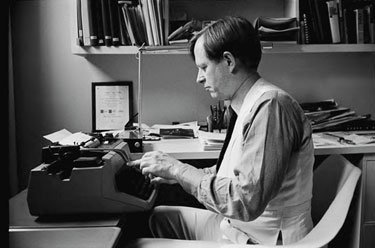Category Archive 'Tom Wolfe'
13 Sep 2018


It’s Leonard Bernstein’s centenary this year, and Alex Ross, in the New Yorker, commemorates the great popularizing conductor with a tribute mixing praise, uncomplimentary gossip, and this regretful perspective on the passing of both Bernstein and his times.
His charisma was indeed potent, but as Bernstein recedes into history he seems more a product of his time than an agent of transformation. He came of age in the New Deal era, when the federal government sank hundreds of millions of dollars into the arts. He benefitted from the cultural politics of the Cold War, even as he suffered under McCarthyism. He launched music-appreciation projects on television at a time when network executives considered Stravinsky’s serialist score “The Flood,†with choreography by Balanchine, suitable for a mass public. The aspirational America of the mid-twentieth century was looking for a Bernstein—a native genius who could knock off Broadway tunes as fluently as he conducted Brahms—and one was duly found. There will not be another, not because talent is lacking but because the culture that fostered him is gone.
He was obviously talented, but he was, in my opinion, as a conductor, far too commonly heavily-handedly didactic, popularizing, and obvious in his approach. He usually seemed to be less conducting, than lecturing de haut en bas from his perch atop the American cultural establishment to a mass 1950s television audience. I thought his appointment to conduct the New York Symphony a terrible descent into vulgar American populism from the era of Bruno Walter. But every once it a while, he was very very good. I can recall hearing an excellent version of some Haydn Symphonies by Bernstein.
I remember, as the years went on, Bernstein became more political in an extremely obnoxious rich-fashionista-poseur-striking-revolutionary-poses manner. His obsequious dallying with Black Panthers brought down on him the gods’s wrath, delivered in the form of a scathing essay by Tom Wolfe which may become Bernstein’s best-remembered memorial:
Mmmmmmmmmmmmmmmm. These are nice. Little Roquefort cheese morsels rolled in crushed nuts. Very tasty. Very subtle. It’s the way the dry sackiness of the nuts tiptoes up against the dour savor of the cheese that is so nice, so subtle. Wonder what the Black Panthers eat here on the hors d’oeuvre trail? Do the Panthers like little Roquefort cheese morsels wrapped in crushed nuts this way, and asparagus tips in mayonnaise dabs, and meatballs petites au Coq Hardi, all of which are at this very moment being offered to them on gadrooned silver platters by maids in black uniforms with hand-ironed white aprons . . . The butler will bring them their drinks . . . Deny it if you wish to, but such are the pensées métaphysiques that rush through one’s head on these Radical Chic evenings just now in New York. For example, does that huge Black Panther there in the hallway, the one shaking hands with Felicia Bernstein herself, the one with the black leather coat and the dark glasses and the absolutely unbelievable Afro, Fuzzy Wuzzy-scale in fact—is he, a Black Panther, going on to pick up a Roquefort cheese morsel rolled in crushed nuts from off the tray, from a maid in uniform, and just pop it down the gullet without so much as missing a beat of Felicia’s perfect Mary Astor voice. . . .
RTWT
19 May 2018


“The intellectual had become not so much an occupational type as a status type. He was like the medieval cleric, most of whose energies were devoted to separating himself from the mob—which in modern times, in Revel’s phrase, goes under the name of the middle class. … Moral indignation was the main thing; that, and a certain pattern of consumption. In fact, by the 1960s it was no longer necessary to produce literature, scholarship, or art—or even to be involved in such matters, except as a consumer—in order to qualify as an intellectual. It was only necessary to live la vie intellectuelle. A little brown bread in a bread box, a lapsed pledge card to CORE, a stereo and a record rack full of Coltrane and all the Beatles albums from Revolver on, white walls, a huge Dracaena marginata plant, which is there because all the furniture is so clean-lined and spare that without this piece of frondose tropical Victoriana the room looks empty, a stack of unread New York Review of Books rising up in a surly mound of subscription guilt, the conviction that America is materialistic, repressive, bloated, and deadened by its Silent Majority, which resides in the heartland, three grocery boxes full of pop bottles wedged in behind the refrigerator and destined (one of these days) for the Recycling Center, a small, uncomfortable European car—that pretty well got the job done…”
HT: The Barrister.
16 May 2018

When his Yale professors rejected the topic of his thesis – Communist influences on American writers, 1928–1942 – Wolfe showed his versatility in a letter to a friend dated June 9, 1956:
These stupid fucks have turned down namely my dissertation, meaning I will have to stay here about a month longer to delete all the offensive passages and retype the sumitch. They called my brilliant manuscript ‘journalistic’ and ‘reactionary,’ which means I must go through with a blue pencil and strike out all the laughs and anti-Red passages and slip in a little liberal merde, so to speak, just to sweeten it. I’ll discuss with you how stupid all these stupid fucks are when I see you.â€
Molliter Ossa Cubent. [“May the earth lay lightly on his bones.” — Ovid, Heroides, VII, 162.]
HT: Vanderleun.
11 Mar 2006

Tom Wolfe in an interview by Joseh Rago discusses the bigoted politics of the American community of fashion.
Mr. Wolfe offers a personal incident as evidence of “what a fashion liberalism is.” A reporter for the New York Times called him up to ask why George W. Bush was apparently a great fan of the “Charlotte Simmons” book. “I just assumed it was the dazzling quality of the writing,” he says. In the course of the reporting, however, it came out that Mr. Wolfe had voted for the Bush ticket. “The reaction among the people I move among was really interesting. It was as if I had raised my hand and said, ‘Oh, by the way, I forgot to tell you, I’m a child molester.'” For the sheer hilarity, he took to wearing an American flag pin, “and it was as if I was holding up a cross to werewolves.”
George Bush’s appeal, for Mr. Wolfe, was owing to his “great decisiveness and willingness to fight.” But as to “this business of my having done the unthinkable and voted for George Bush, I would say, now look, I voted for George Bush but so did 62,040,609 other Americans. Now what does that make them? Of course, they want to say — ‘Fools like you!’ . . . But then they catch themselves, ‘Wait a minute, I can’t go around saying that the majority of the American people are fools, idiots, bumblers, hicks.’ So they just kind of dodge that question. And so many of them are so caught up in this kind of metropolitan intellectual atmosphere that they simply don’t go across the Hudson River. They literally do not set foot in the United States. We live in New York in one of the two parenthesis states. They’re usually called blue states — they’re not blue states, the states on the coast. They’re parenthesis states — the entire country lies in between.”
/div>

Feeds
|






